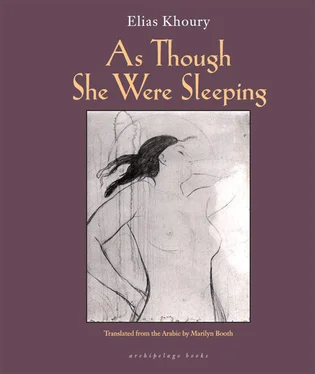Stories began to spread about the short woman named Kati. People said her slight husband treated her brutally, forcing her to have sex with the taller brother.
Haraam! breathed the nun.
Did anyone actually hear this story from the woman herself? asked Niqula.
God preserve us! moaned the nun.
Niqula said the two men had fled to Damascus seeking refuge from the stories careening around Beirut. But Saadeh insisted on her version, which was that the wife herself exposed the two brothers and only then was Madame Marta Shamaat summoned as a witness. Kati went to the police station, stood there in front of the officer in charge, and said she had been married off to two men. She could no longer bear this life. She reenacted what had happened. (This was what you had to do in criminal cases, Saadeh explained.) The woman with the unkempt hair stood as tall as she could and represented how her husband’s brother slept with her. She said the business would happen on the orders of the husband — before his eyes, in fact. God save her, she could not do it anymore and she wanted to die. She said her husband ruled out having children. It was the tall one who kept me from it, I don’t know what he did, Efendi, but now I can’t have children, and I don’t know anymore whose wife I am, or who I am. He beats me, too. And they’re so stingy they won’t turn the lights on. I’ve never seen anyone stingier. Once the patients have gone, it’s completely dark in there. They just keep one candle lit and they live like the blind. Everything is black and trembly and ghostlike.
The woman acted out what it was like to live inside the color black. She closed her eyes and repeated her stories. They kept her in the station because she declared herself terrified of returning to the house. The policemen arrested the two doctors and locked them up on the orders of the public prosecutor, who then freed them — it was said — when the French high commissioner intervened. It was rumored also, though, that the woman was not in her right mind, that she imagined things or made them up. No one knew the truth, people murmured.
And then? asked Milia.
How would I know and then — I just know that God was our salvation, my girl, and if it weren’t for God’s mercy, what would have happened to us? This woman, this Kati, came to them in the first place because she was ill, and then who knows what they made her drink, and then they married her, and then they ruined her life and destroyed her honor.
Saadeh stood up, put her handkerchief to her eyes, dabbed at her tears, and stumbled into the kitchen, coming back with a jug of water. She took a drink and handed the vessel to her daughter.
Kati stands before the policeman and informs on the pair of doctors. The woman with tousled hair lies down on the floor of the police station and demonstrates how the two men would have sex with her. Reclining on the patient’s chair, Kati flips between the two doctors as if she is a fish on the deck of a boat, just yanked from the water. She opens her mouth, tries to suck in a breath, and goes into a stunned stillness.
Milia told Musa the story was made up. The twelve-year-old boy didn’t understand any of this business. He took her hand and asked her to come with him to the sea.
Why don’t you ever come with us to the water anymore?
Ask Salim. Your big brother said the sea’s off limits because I’m a girl.
I want to become a girl too so I can stay with you in the house and not go to school.
Milia laughed at her brother’s naïve words. No, brother, we stay the way we’re created, you can’t become something else.
Would you like to become a boy so you could come with us to the water?
I’d like to be a boy not just because of the sea, but no. . I don’t know, she said, and then said nothing more. Anyway, that’s the way the world is.
When Musa told her of Mansour’s wish to marry her and that she would go and live with him in his town, far away, in her brother’s eyes she saw that question for which there was no answer. Why did a woman have to follow a man to somewhere she didn’t even know the location of? Why was the world like this? After her experiences with Wadiie and Najib, things seemed even more cryptic. Wadiie had taught her that being a man meant carrying many faces around with you, while Najib had shown her the dilemma of a man who must search for something or somewhere to carry him. And a woman has to be the faces, and she has to be the places. She has to be everything — that is, she has to be nothing at all.
It’s Salim’s fault, said the mother.
No, it’s Najib’s fault, said Musa. Najib is a coward and he wants someone who’s going to carry him all the time because he can’t carry himself.
May God pardon him, Milia said, seeing before her how the little airborne bodies plunged to their deaths. This one she would call the dream of the blind little birds and she would never tell it to anyone. And she never did.
Ever since that encounter in the garden when she had stood close to Najib beneath the lilac tree, she had feared the blind bats who fly into the treetops and whose leavings splatter along the wall. Then the dream of the birds came and she was the first to know the truth.
She comes off the balcony and goes to bed, leaving Mansour on his own. He had asked her why she didn’t cook her favorite dish, the one he had come to love the most. There in Palestine, and in the Hourani family with their roots in Jabal el-Arab — as Mansour insisted on calling the Houran region of Syria — they called it shakiriyya , while in Lebanon they called it labanimmuh-wa-ruz . Mother’s milk with rice.
Milia took special pride in two dishes. She called them Beirut’s greatest culinary achievements, the city’s finest and proudest contributions to the cuisine of greater Syria: laban immuh and kibbeh arnabiyyeh . When Mansour ate kibbeh arnabiyyeh he felt in his gut that it was a true occasion in every sense of the word. One needed serious training to appreciate it fully. Tahini was cooked with seven different citrus fruits, onions were cut to resemble wings, the chick peas all but melted in the tahini mixture with its swirling colors from pale to brown, and finally there were the balls of finely ground meat and — on top of that! — the melt-in-your-mouth chunks of stewed meat. He was utterly bewitched by this dish, which Milia made the central festivity of her Nazarene life.
Mansour could not find his way into this world hedged round with secrets and dreams inside of which Milia lived. He had been lost outside of it ever since their time at the Hotel Massabki in Shtoura. There, dreaming became intertwined with sex, and the images conjured up by the blind flying creatures mingled for Milia with the fragrance of the lilac. All of this left her feeling confused and uncertain of how to behave. What could she do but abandon herself to a drowsiness that pulled her downward, into the deep waters of her spirit, prone, still, and silent?
On that interminable journey through the fog of Dahr el-Baydar Milia retrieved her dreaming and returned to herself. At first her recollection was dubious: the woman whom she saw in her first dream on the night of her wedding was her double. A young woman in her early twenties lying full length on the white expanse of the bed as the whiteness of her skin gave off a translucent glow. Mansour told her that her pale complexion was as clear as water. She was his life’s mirror, he told her.
I’ve begun now to understand Arabic poetry, he said, and I know how to appreciate its beauty. He explained to her that the ancient Arab poets who lived in the desert only wrote love poems to fair-skinned women, as if a woman’s pallor was a transparent window that the poets’ inner selves could open when they wanted access to the worlds of shadow, cool refuges, and sleep — and perhaps to themselves. A woman has to be pale white, still and somnolent, he said. She must be like an oasis. A woman shrouded in the mystery of half-shut lashes leads a man into the labyrinths of love, he said.
Читать дальше












